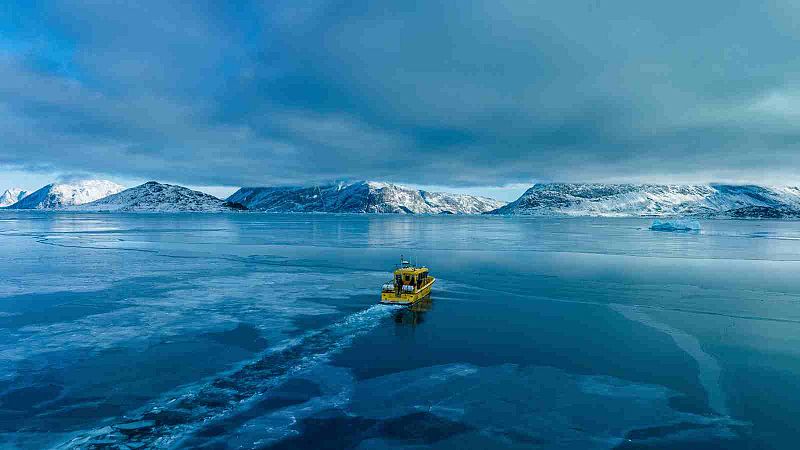
“People often think of countries like India, Italy and the US when we talk about climate change and heatwaves,” says Dr Sarah Kew, researcher at the Royal Netherlands Meteorological Institute.
But, as a new study from the World Weather Attribution (WWA) group shows, “even cold climate countries are experiencing unprecedented temperatures.”
A record-breaking heatwave in Iceland and Greenland last month was made around 3°C hotter due to human-caused climate change, the group of researchers has found.
On 15 May, the Egilsstaðir Airport station in Iceland recorded 26.6°C, a new national record for the month. Just days later, on 19 May, the Ittoqqortoormiit station in eastern Greenland reported 14.3°C, well above the monthly average of daily maximum temperatures of 0.8°C.
“To some, an increase of 3°C might not sound like much, but it contributed to a massive loss of ice in Greenland,” adds Dr Kew, one of 18 global researchers behind the new WWA study.
The climate change-driven heat from 15-21 May corresponded with around 17 times higher than average Greenland ice sheet melting, according to preliminary analysis from the National Snow and Ice Data Center in the US.
Arctic communities are feeling the heat
“In the Arctic, local populations have built communities on weather conditions that have been stable for centuries,” says Maja Vahlberg, Technical Advisor at Red Cross Red Crescent Climate Centre.
“However, heatwaves like these signal emerging risks in Greenland and Iceland that are warming much faster than other regions.”
The Arctic has warmed at a rate more than double the global average. This phenomenon, known as arctic amplification, is largely driven by melting sea ice: as the ice vanishes, it is replaced by an expanding area of dark ocean water that absorbs sunlight instead of reflecting it.
“Inuit communities face growing threats to traditional ways of life, while people in Iceland with existing health conditions are increasingly vulnerable to rising heat,” adds Vahlberg.
Although Iceland experiences very low rates of heat-related deaths compared to countries in southern Europe, the heatwave may have impacted people with underlying health conditions before they had time to acclimatise.
Warnings of sunburn and softened roads in Iceland highlight how cold-climate countries are beginning to experience new climate risks that can catch people off guard, the researchers say.
Sea ice loss is also impacting Inuit Indigenous communities, who make up 90 per cent of the population in Greenland. Reliable sea ice is vital for travel, but thinning ice is creating unstable conditions that cut off access to traditional hunting grounds.
The loss of sea ice has also seen a rapid decline in the number of sled dogs in Greenland, which have been used by Inuit groups for thousands of years.
Icelandic heatwaves set to become a further 2C more intense
An Arctic heatwave might still seem like an anomaly, but such events are becoming increasingly common.
“In recent years, my colleagues and I in the Climate Group at the Icelandic Meteorological Office have noticed unusual weather extremes, such as rainfall events that far exceed in rainfall duration and amount, anything expected based on prior data,” says Dr Halldór Björnsson, group leader at the Icelandic Met Office. “In short the old statistics do not apply.”
May’s heatwave broke records even in weather stations going back more than a century - including in Stykkisholmur, for example, where there is reliable data for more than 174 years. Dr Björnsson says the event was the largest May heat they’ve ever seen, with 94 per cent of weather stations setting new temperature records.
“What we are witnessing is not just an isolated event, but a change in weather statistics,” she says.
If greenhouse gas emissions continue on their predicted course, and warming reaches 2.6°C by 2100, heatwaves are set to become a further 2°C more intense in Iceland.
For Greenland, the scientists analysed data from a weather station in the eastern part of the country. They found the hottest single day in May was about 3.9°C warmer than it would have been in the preindustrial climate.
While this analysis did not include climate models, the scientists say it's likely that almost all of the increase was due to climate change.
How do Arctic heatwaves impact the rest of the world?
“What happens in the Arctic doesn’t stay in the Arctic,” warns Dr Friederike Otto, Associate Professor in Climate Science at the Centre for Environmental Policy, Imperial College London.
“The unusual heat would have accelerated ice melt and contributed to sea level rise, which is threatening the survival of communities on small islands, like Vanuatu, Kiribati and Tuvalu, as well as Indigenous peoples such as the Inuit.”
Greenland loses an average of 43 billion tonnes of ice per year, and a growing body of evidence suggests that continued warming could push the country past a tipping point where the melting of the ice sheet becomes irreversible.
A recent study has warned that even 1.5°C of warming could trigger the loss of ice sheets in Greenland and Antarctica, potentially causing several metres of sea level rise over the coming centuries, which would threaten the existence of low-lying islands around the world.
Another potential tipping point could have concerning consequences for Europe. The melting of the Greenland ice sheet is known to slow down the Atlantic Meridional Overturning Circulation (AMOC), a vast ocean current that could weaken or collapse with further ice melt, potentially disrupting global climate patterns, causing severe weather changes worldwide and plunging Europe into a deep freeze.
“We know exactly what is causing the warming and the melting - the burning of oil, gas and coal. The good news is we can stop extreme heat from getting worse and worse, which means shifting away from fossil fuels,” adds Dr Otto.
“That does not require magic. We have the know-how and technology needed, but it does require recognising that human rights are for all, not just the rich and powerful.”







